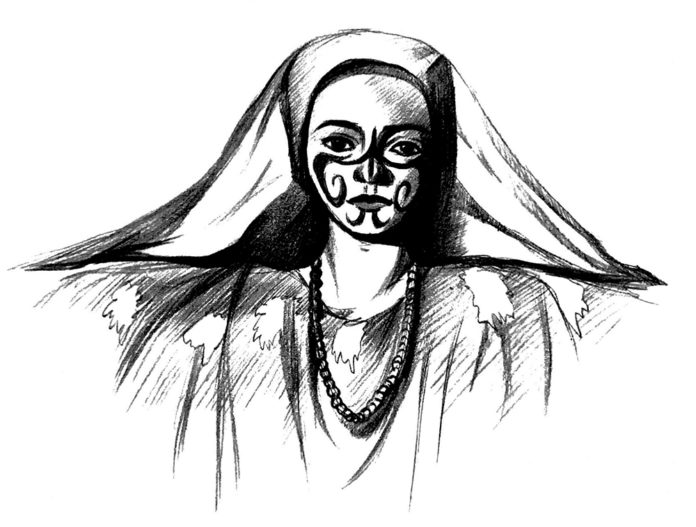The stereotypical novelties of the epic crime genre seek to outline lawless truths. The rise and fall of a charismatic figure detail the evolution of immoral chaos and social destruction. Metaphysical forces of cause and effect hold a hustler accountable for his arrogance or indiscretion. This situational pendulum swings through what seems like a natural law of comeuppance where one mistake has the ability to restructure fate. With this narrative design firmly in place, co-directors Ciro Guerra and Cristina Gallego give the genre a culturally-specific makeover in their recently released film, “Birds of Passage.” The story of two Colombian families shedding their native traditions and adopting secular materialism unfolds over a 20-year span in the late 20th century. Guerra and Gallego activate the distinct locality of La Guajira, Columbia’s most northern providence, by drawing on the spiritual conventions of the Wayuu people. The marijuana drug trade ignites violent conflict while the erosion of their culture’s moral underpinnings draws a prosperous family away from their reverent equilibrium.
“Birds of Passage” is full of cliched reflexes that hollow out the complexities of its characters in service of a postmodern outline in order to reignite the assumptions we assign to the crime genre. The structure garners comparison from staples like “The Godfather,” “Scarface” and “Casino.” Intricate world-building in a crime film establishes a set of rules that govern the nature of business relations. Each protagonist, family or group has a precedent for how to deal with issues and ease complications. Without these elements, the environment cannot have believable tension and hierarchy. When the rules of the game are broken, vengeful warfare ensues. A great crime film finds its thrill in who gets even and which rules are broken. “Birds of Passage” curbs its brutality to focus in on the art of war.
Úrsula is the matriarch of the Wayuu people, and she sets their spiritual course. She prepares the participants for sacred rituals while commanding authority in her immediate family. Her decisions are guided by an understanding of what it takes to make a tradition survive. When a young boy rejects his orientation in horseback riding, he grunts, “I want to learn to fly a plane, not ride a horse.” The hot-blooded ambition of a new generation raised in the riches of the drug trade is emboldened to stare at the sky. They see upward mobility and material gains. Unfortunately, the film glazes over the process of cultural change. Through large gaps of time, we lose the transfer of moral values. The elders’ responsibility to pass on knowledge is blurred with macho chauvinism. Without this detail, the film’s antagonistic characters, Moisés and Leonidas, deflate into tropes that guarantee plot direction. Their lack of moral foundation proves the fragility of an honorable tradition. When rules aren’t respected, they lose their meaning and political weight.
In scenes of violence, the camera captures the aftermath of fresh wounds. We arrive at the end of a conflict just in time to see the Wayuu discover their consequences. By prioritizing their emotional reaction over sensational violence, the film saves its ferocity for the finale and highlights the group’s bond beyond flesh. When Úrsula’s cautiously optimistic son-in-law, Rapayet, builds his unassuming marijuana business into an empire, the Wayuu way of life is minimized. Vibrant garments are juxtaposed with gold Rolexes while burial tombs are hollowed out as hiding spots for drugs and guns. This intense, albeit obvious generational ignorance, manifests itself through Leonidas’ cartoonish arrogance. When he disrespects Aníbal’s family, any lingering sentiment for the old rules of trade completely evaporates. Throughout the film, the two families negotiate by each sending a messenger to present proposals. This individual’s life is protected by sacred law until vengeance and retaliation consume the feud. Úrsula’s pleas for peace are ignored.
The conflict between traditional principles and modern desires is lifted out of the intricate Wayuu community and is representative in generational shifts of culture. Each generation inherits a set of circumstances they did not create. They must balance respect for the collective will with confidence in their own judgment. The Wayuu’s rapid ascension into luxurious wealth outpaced the necessity of time-consuming and faith-based rituals. Rapayet was naive to the lack of discipline instilled in his family’s youngest participating member. It was tradition for an individual’s rogue actions of incivility to represent the honor of the collective. The younger generation did not understand this personal responsibility. Their individualism pitted them against the world with no conception of family backing. The tragedy in “Birds of Passage” registers on a broad scale as opposed to specific character idiosyncrasies. Guerra and Gallego’s film is filled with cultural significance but genre conventions ultimately produce familiar results.
![]()




































